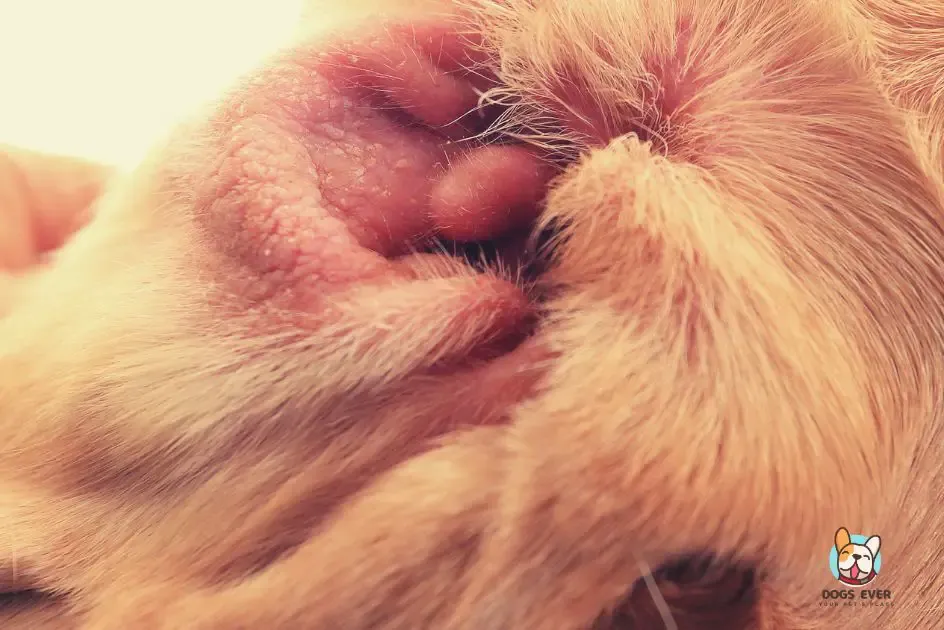· dogs · 6 min read
How to know your dog is allergic to food

You have most likely heard about people being allergic to food. But did you know your fur buddies are also prone to allergic reactions to food?
Food allergies are mostly inherited in dogs and can develop at any age, regardless of breed and sex. Therefore, they are mostly genetically inherited.
But how can you determine if your dog is allergic to a certain food diet? Or how can you identify unusual behavioral/physical changes in your dog as an allergic reaction?
Let’s find out in this article.
Allergies in dogs
Allergic reaction refers to an immune system intolerance towards a substance (of any nature) called an allergen, resulting in a hypersensitive reaction.
Dogs are prone to environmental and food allergies, which can be classified differently depending on the reactivity and the route of allergens. The most common allergens are insects, plants, or animal proteins.
Food allergies in dogs
Not every dog has food allergies, just like people. But if your dog initially didn’t suffer from food sensitivities doesn’t mean it can’t in the future too.
The time duration that symptoms of an allergic reaction might take depends on the severity of food sensitivity.
In some cases, it might take between a few minutes to a couple of hours. The symptoms can also take as long as 14 days period.
How and Why do dogs become allergic to food?
Food allergies in dogs are mostly genetically inherited. The food allergy is not always active from the start despite being present in the body. It can but can progress gradually and develop at any age in dogs.
Dogs become allergic to food because certain elements present in their diet are strongly resisted by their immune system in the form of a reaction. Scroll down a little to learn about possible dog food allergy symptoms.

Common food allergens for dogs
Protein is among the most common food allergen in dogs. Reportedly, beef, lamb, chicken, milk, eggs, and soy tend to be recurring causes of food allergies in dogs. Sounds sad, as this is a list of some of the most delicious meals.
Some dogs might also experience wheat and grain allergies. However, remember that if your dog doesn’t show allergic symptoms to certain foods, it doesn’t mean it can’t develop them in the future.
Allergy testing for dogs
No method of allergy testing is a hundred percent reliable. However, a food-elimination diet trial is considered one of the best ways to diagnose food allergies in dogs.
With this method, an entirely new diet is fed to the dog for several weeks, and then the previous diet is gradually reintroduced. It is very efficient in delineating food intolerances and food sensitivities and identifying the allergen.
The other two ways to get your dog tested for diagnosing an allergy are intradermal skin testing and RAST testing.
Intradermal skin testing is for environmental allergies( caused by fleas, mold, weeds, trees, etc.) in which the subcutaneous layer of a dog’s skin is injected with sixty different allergens.
RAST test, also called the radioallergosorbent test, is a type of blood test to identify if your dog is allergic to particular antigens.
Signs that show that your Dog might be allergic to his food
We have listed out the most common symptoms that indicate that your dog has food allergies. If you observe any of the following signs, consult the vet right away.
Allergic Dermatitis
Food intolerance in dogs leads to an allergic reaction of the skin in dogs called allergic dermatitis. It is characterized by itchy skin, hair loss, irritation, inflammation, and redness.
It is super uncomfortable for dogs, and prolonged dermatitis due to allergic reactions can lead to more secondary skin infections.
Chronic Ear Infections
One of the prevailing causes of ear infections in canines is food allergies as a result of sensitivity to a particular dog’s diet. For instance, if your furry friend is allergic to food rich in carbs or sugar diet, then feeding such a diet can result in yeast infections & other harmful conditions.
Even generally, it’s better to keep checking your dog’s ears as infections are super uncomfortable and can take a toll on your dog’s physical and mental health.

Swollen Face
Your dog, when exposed to dog foods that trigger its immune system, can result in a bloated face. A swollen face is quite a serious symptom, and seeking immediate vet consultancy is advised. Don’t wait for the swelling to reduce on its own!
Watery Eyes
If you see your dog’s eyes watering up with frequent crusted tear marks in eye corners, this most probably indicates an allergic reaction triggered by certain foods.
In order to clean the crusted area, use a soft wet towel and rub gently and provide maximum comfort to these sweet creatures.
Gastrointestinal Issues
Gastrointestinal issues are another common symptom of food allergy. The intake of trigger food distresses your dog’s stomach resulting in nausea, stomach cramps, diarrhea, and vomiting.
Dogs struggling with food allergies are likely to undergo weight loss. Bloat is also common in dogs with similar symptoms, so it’s better you consult a vet to know better.
Hair Loss
The allergic reaction due to food sensitivities makes your dog’s skin super itchy. It will make scratch, lick, and rub against its skin excessively and thus resulting in associated hair loss.
If you start observing abnormally long patches on your dog’s body without hair, it is very likely a result of a reaction to food intolerance.
Another alarming symptom your dog might face as a result of a severe allergic reaction to food is rapid heart rate. 60 to 100 beats per minute are the average heart rate for dogs that are large and in good health. In the case of smaller dogs, it should be 100-140 beats per minute on average.
Long-Term Effects of Dog Food Allergies & Treatment
Food allergies, when left untreated for longer periods, can have a drastic impact on your dog’s health.
Although, there’s no proper cure for treating food allergies permanently. But getting your dog diagnosed and consulting your veterinary nutritionist is essential to minimize the effects of the reaction.
The vet will put your dog through a food trial to identify the root cause. And then recommend a hypoallergenic diet that strictly needs to be followed without the interference of another type of food or treats.
Your vet might recommend immunomodulatory medications to combat food sensitivity. Antihistamines to minimize itching and Corticosteorides in order to reduce swelling as a result of allergic reactions. These two medications are considered the most effective in calming down the symptoms.
Conclusion
So, if you notice your dog suffering from any of the symptoms mentioned above, it most definitely indicates a food allergy. No need to panic too much as vets are there to help you.
The professionals will help find out the possible root cause of food allergy by subjecting your dogs to food trials. The medications will also make your beloved dog feel better, so worry not!
Hopefully, after reading this article, you know how to know your dog is allergic to food!



